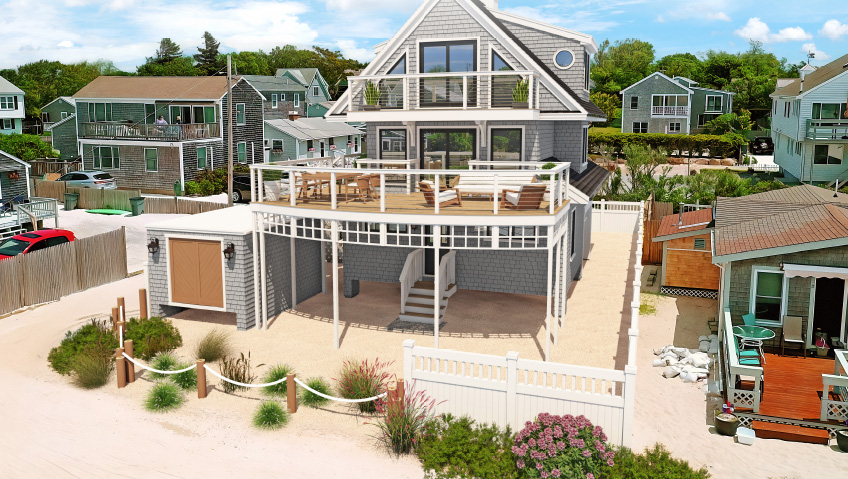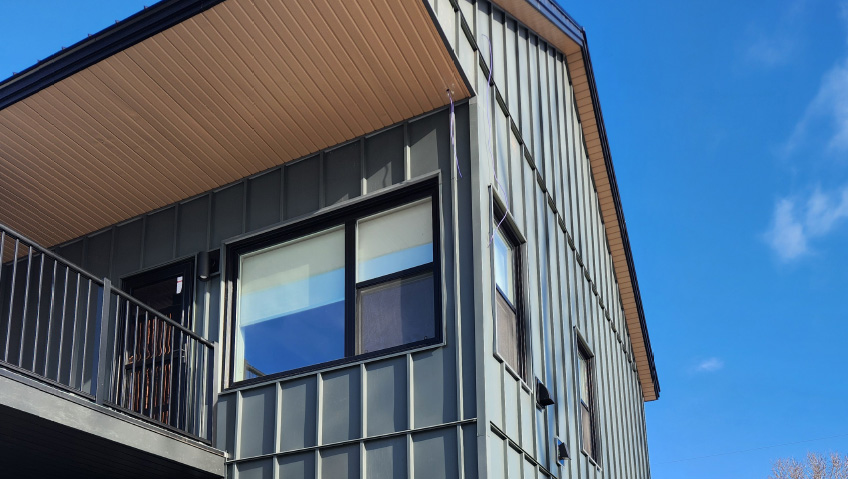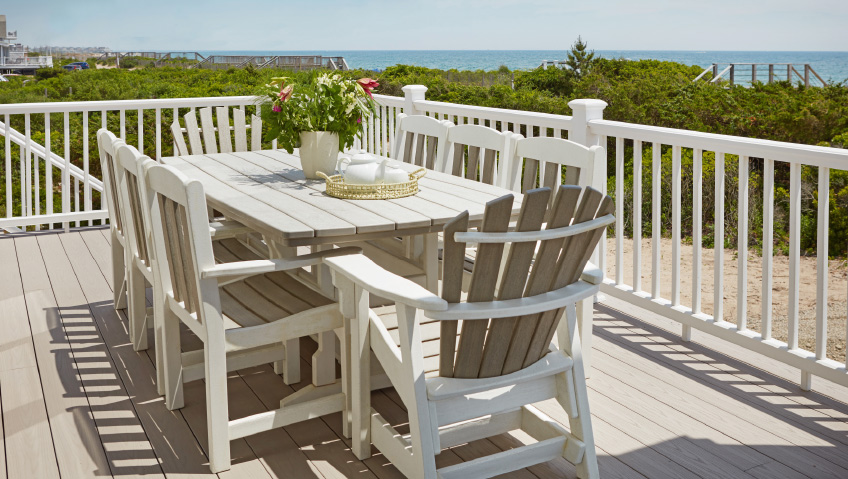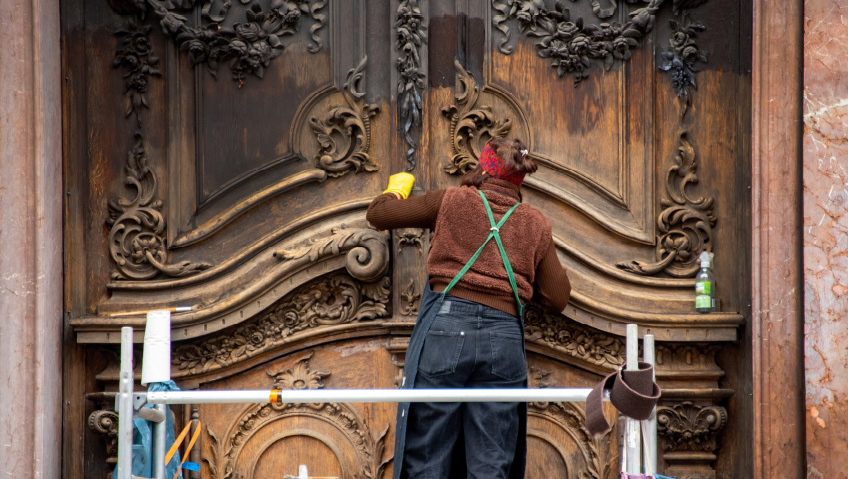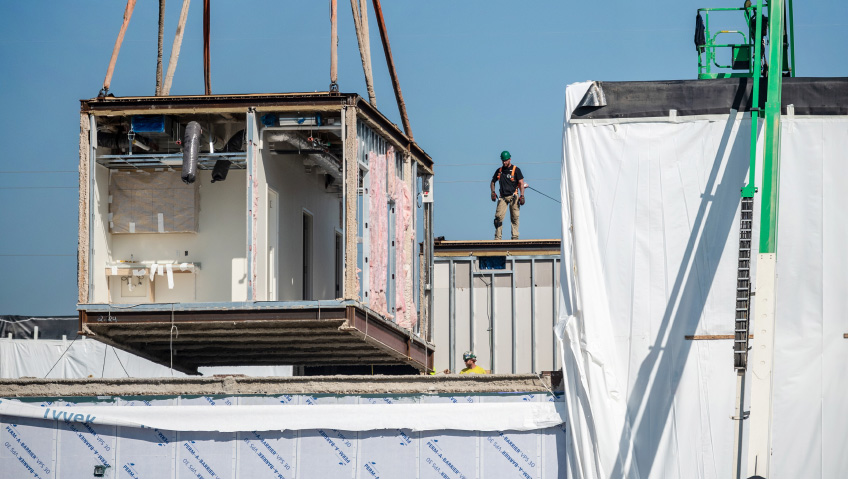Ron Bourque, AIA, co-founder of Worcester, Massachusetts-based Integrity Modular Design and Construction, has spent over 35 years in architecture and construction, building a career marked by creativity, hands-on expertise, and innovation. For Bourque, Integrity Modular represents the culmination of that career, a company built on personal investment, freedom, and a desire to make a lasting impact.
“We have the freedom to experiment with different types of housing and concepts, without having to answer to someone questioning our every move,” he explains.
By funding the business with personal capital and carrying no debt, Bourque and his partners, General Contractor Ricky Martins and Plumbing Contractor Paulos DeMorais, use their combined 90 years of experience to explore unconventional approaches without the pressure of external investors. This independence allows the company to focus on efficiency, quality, and social impact while remaining agile and responsive to new opportunities.
“We view this as a family business, with our sons and daughters growing into the business to provide the next generation of leadership,” says Bourque. “With our kids either in college studying engineering or in the trades, we are able to allow them to grow in their respective fields while contributing to the strength of the company. We are looking to have them bring a fresh perspective and energy to the firm, helping expand operations and explore future growth. Bourque reflects, “We want to create something enduring, something that contributes to both society and the future of construction.”
Integrity Modular is a turnkey design and construction firm managing every aspect of the project lifecycle. From design and permitting to construction and installation, the company delivers fully finished units, including appliances, fixtures, and interiors. “As the architect running these projects, I have incredible control over the schedule,” Bourque notes. This integrated approach ensures timelines are predictable, costs are controlled, and quality is consistently high.
The company employs in-house tradespeople, including electricians, plumbers, carpenters, and fire protection specialists. This vertical integration eliminates dependency on external labor, which is critical given the aging trades workforce in the United States. According to Bourque, “The average electrician is 58 years old, the average plumber is 59. Without our in-house team, projects would face major delays.”
Having all trades under one roof allows the company to maintain disciplined scheduling, unaffected by weather or subcontractor availability. “If a traditional construction crew is delayed by rain, it can take weeks to recover. We don’t have that problem,” Bourque explains. This ability to control every aspect of production contributes directly to the company’s efficiency and cost-effectiveness.
A key differentiator for Integrity Modular is its focus on prefabrication, which reduces inefficiencies in traditional construction. Every module is constructed in the factory, overbuilt slightly for transport, and fully finished with interiors and appliances. “It takes us three days to construct a two-bedroom apartment from piles of wood to a finished product,” Bourque shares. The second unit is then completed on a staggered schedule, essentially creating an assembly-line process that maximizes speed and consistency.
The process is highly engineered. Exterior elements, window trims, corner columns, and parapets are preassembled, allowing rapid on-site assembly. This approach drastically reduces construction timelines, from 18 months for conventional projects to as little as five months for modular buildings. For investors, this accelerated timeline means faster returns and lower financing costs. Bourque adds, “We dissect every inefficiency in the construction process and turn it into an assembly process. It’s about maximizing efficiency, not cutting corners.”
Additionally, this modular system allows for scalability across multiple projects. Because each unit is built with the same rigorous standards and tracked via a unique serial number, Integrity Modular can replicate successful designs efficiently across multiple locations, ensuring quality and consistency while reducing project risk. This approach positions the firm to respond quickly to market demand, whether for affordable housing, senior living communities, or seasonal workforce housing.
While profitability and efficiency are important, Integrity Modular is equally committed to social responsibility, and up to 25 percent of the company’s business is dedicated to working with nonprofits and affordable housing initiatives. One notable project is the Seeds of Hope program in Worcester, designed to provide ADA-accessible housing for at-risk seniors with integrated support services.
“We’re not just dropping units on a lot; we’re wrapping services around them to ensure residents succeed,” Bourque emphasizes. These projects are intended as prototype models for Massachusetts, demonstrating that modular housing can be affordable, efficient, and supportive of vulnerable populations.
The company also experiments with tiny homes and accessory dwelling units (ADUs), which address both urban density and seasonal workforce housing needs. ADUs, or “granny flats,” can be installed on underutilized property and provide affordable, high-quality housing options for seniors, seasonal workers, or low-income residents. Bourque explains, “We can reduce costs, maintain quality, and provide communities with solutions that didn’t exist before we started.”
Integrity Modular is also tackling the seasonal housing crisis on the Cape and other East Coast locations. Many restaurants and businesses struggle to hire staff because housing is limited or prohibitively expensive. Bourque has developed an innovative approach: modular tiny homes that can be temporarily installed, connected to a shared utility manifold, and relocated after the season ends.
“This approach allows businesses to provide housing for their employees during peak season, and then those units can be repurposed in other communities,” Bourque explains. The solution reduces costs for municipalities and businesses while providing flexible housing for workers, a model that could be scaled to address seasonal housing shortages nationwide.
Bourque is also exploring ways to optimize utilities and infrastructure, reducing overall costs by designing modular homes that can share systems like water and electricity. By thinking creatively about these efficiencies, Integrity Modular demonstrates how innovation can meet the practical challenges faced by many towns and businesses.
Sustainability is another critical component of Integrity Modular’s approach. By constructing most components in the factory, the company produces less than 1 percent waste, compared to the 15 to 20 percent typical of traditional construction sites. Prefabrication reduces material waste, minimizes site disruption, and supports environmental stewardship.
The company is also moving toward passive building standards, incorporating advanced insulation, sealants, and energy-efficient construction principles. “We’re achieving sustainability by design. As energy codes evolve, we’ll already be ahead of the curve,” Bourque notes. By embedding efficiency and environmental responsibility into the core of the business, Integrity Modular is proving that modular construction can be both profitable and environmentally conscious.
This sustainability extends beyond environmental factors to social impact, as the company prioritizes partnerships with nonprofits, government agencies, and educational institutions to deliver solutions that serve communities effectively and inclusively. Education and knowledge-sharing are key priorities for the firm, and Bourque regularly hosts students, nonprofit representatives, and local officials to showcase modular construction processes. From factory tours to on-site assembly demonstrations, visitors gain firsthand insight into the advantages of modular housing.
“The next generation will inherit the housing challenges we face today,” Bourque emphasizes. “If they understand modular construction and the efficiencies it brings, they can apply that knowledge to future projects.” The company works closely with architecture students and universities such as Worcester Polytechnic Institute to provide real-world learning experiences, from factory workflow to site installation. By fostering this knowledge-sharing, Integrity Modular is ensuring that the next generation of architects, engineers, and builders can continue to innovate, improve efficiency, and create socially responsible housing solutions.
Integrity Modular is establishing itself as a pioneer in Massachusetts and beyond. Bourque recounts meetings with the Secretary of Housing and local banks: “We figured out financing for modular projects ourselves, while others were just starting to explore it,” he shares. This leadership and willingness to innovate has earned the company recognition from policymakers, nonprofit organizations, and community leaders alike.
The firm’s success with early projects, including 30-unit buildings and multiple ADU installations in progress, demonstrates both the scalability and versatility of modular construction. Bourque explains, “Once a client experiences the efficiency and quality of modular, they rarely go back to stick-built construction. It’s a vote of confidence in the process.”
Looking ahead, he envisions a future where modular construction is a mainstream solution for a variety of housing needs: affordable housing, workforce housing, senior living, and small urban units. By combining operational discipline, technical innovation, and social responsibility, Integrity Modular is proving that modular housing is not just a construction method; it is a strategic solution capable of reshaping the housing industry.
“Our goal is to create a framework that can be replicated, scaled, and adapted by others,” Bourque says. “We’re showing that modular can be better, faster, and more socially impactful than traditional construction, and that’s a model we want to see grow.”

